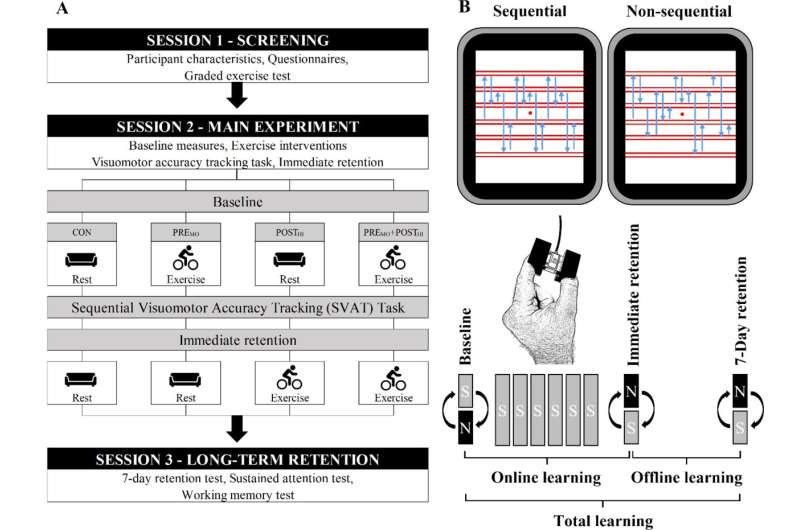This article has been reviewed according to Science X's editorial process and policies. Editors have highlighted the following attributes while ensuring the content's credibility:
fact-checked
trusted source
proofread
Study: Physical exercise boosts motor learning—and remembering what one has learned

Violinists, surgeons and gamers can benefit from physical exercise both before and after practicing their new skills. The same holds true for anyone seeking to improve their fine motor skills. This is demonstrated by new research from the University of Copenhagen, which, among other things, can make the way we rehabilitate more effective.
Before a violinist tunes their instrument or a surgeon stands at the training table to learn the skills needed for a new symphony or surgical procedure, they might consider heading out for a bike ride or run. Once they've practiced the new skill, there's good reason to put on their workout attire again.
Indeed, being physically active and elevating one's heart rate has the wonderful side effect of improving our ability to learn by increasing the brain's ability to remember.
In a study published in the journal Neurobiology of Learning and Memory, researchers from the Department of Nutrition, Exercise, and Sports have shown that this effect also applies to the formation of motor memory, enabling us to recall and perform tasks such as riding a bike, drive a car and lace up our shoes, almost automatically.
Before or after is good. Both are best
"Our results demonstrate that there is a clear effect across the board. If you exercise before learning a skill, you will improve and remember what you have learned better. The same applies if you exercise after learning. But our research shows that the greatest effect is achieved if you exercise both before and after," says Ph.D. Lasse Jespersen, first author of the study.
Specifically, the researchers see around 10% improvement in people's ability to remember learned motor skills when exercise is included either before or after an exercise. And, the effect can be enhanced by exercising at both times.
"Things can't go wrong if a bit of physical exercise is incorporated. A person will experience beneficial effects. This is probably because physical activity increases the brain's ability to change, which is a prerequisite for remembering," explains co-author Jesper Lundbye-Jensen, who heads the department's Movement and Neuroscience section.
The effect applies to everyone, including children, adolescents and older adults, but in particular, anyone who regularly needs to learn new skills. Moreover, the effects may hold significance for individuals undergoing rehabilitation, aiming to recover mobility and lost motor skills.
Gamers and musicians excluded
Sixty-seven test subjects were involved in the research project. To ensure for comparable data, all subjects were young men between the ages of 18 and 35 who were not physically or mentally impaired in ways that could limit their learning ability and physical performance.
The researchers examined the subjects' behavior and performance while reviewing one of four possible scenarios.
First, they either rested or exercised moderately on a bicycle. After that, they were subjected to a fine motor task in the form of a simple computer game that, with a small device on their fingertips, challenged and practiced the participants' motor dexterity.
Next, they either had to exercise intensely on a fitness bike or rest. Thus, there was one group that rested both before and after, one that trained both times, and two that trained once, either before or after. Their skill level and memory were tested again after seven days to assess whether what they had learned stuck.
As a somewhat unusual criterion, professional musicians and gamers were excluded as possible participants.
"People with extensive experience in practicing motor skills typically start at a different level. While the motor tasks used in the research study were unknown to all, involving experts would have changed the dynamic from the get-go. But that doesn't mean they wouldn't benefit from the effects we've shown. To the contrary, in a future study, it could be exciting to investigate how exercise affects people with elite-level fine motor skills," says Lasse Jespersen.
Helping hand for those rehabilitating
The increased effect of motor learning is something everyone can benefit from. Children who are developing their motor skills are often highlighted, and previous studies with pianists have already shown that people with extraordinary motor skills also benefit from exercise.
At the other end of the spectrum, the new knowledge could make an important contribution as well. For example, among those needing to regain mobility after an accident.
"Typically, rehabilitation is divided between two or three different disciplines. In practice, this may mean that Mr. Smith will have physical training with a physiotherapist on one day, work with an ergonomist the next, and train cognitive abilities with a psychologist on the third. Our research suggests that it could be wise to plan rehabilitation so that these areas are considered together, as doing so could have a synergistic effect," explains Jesper Lundbye-Jensen, who points out:
"Coming back often entails hard work, and even slight improvements in efficiency can mean a lot to people in that situation."
In the long term, the researchers hope to be able to provide such recommendations with more ammunition for a long-term study where more lasting effects can be measured. A longer-term study would also let the researchers investigate whether the effects observed by the study become even greater over a longer trial period.
More information: Lasse Jespersen et al, Acute exercise performed before and after motor practice enhances the positive effects on motor memory consolidation, Neurobiology of Learning and Memory (2023). DOI: 10.1016/j.nlm.2023.107830




















